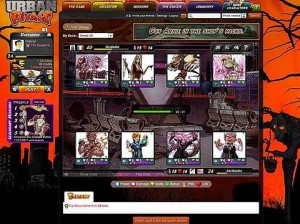By DAVID LIAN
Played a game on Facebook or Google+ recently? Casual gaming seems to have taken the market by storm in the past year or so, with people on iPads and iPhones playing Zombie Cafe or Japan Life.
I was never a big fan of “free” and “casual” games online, especially those that are on Facebook and allows your friends to send invites (Read: spam) all over your Facebook wall like FarmVille, CityVille, Zoo Keeper and Mafia Wars.
The mechanics of the games seem simplistic – too simplistic. For example, an early version of Facebook game required you to “bite” as many Facebook friends as you could, and hope they would “bite” other people in return, all to see who would be the highest ranking “vampire.”
Clearly a Ponzi scheme turned into a game.
And then there’s the advent of free-to-play games proliferating the marketplace. These games adopt a model where an initial portion of the game is available for free while coaxing players to pay a fee (or multiple fees) to unlock more features.
There’s nothing wrong with the free-to-play model; even the much-acclaimed World of Warcraft game has gone free-to-play. However, it does seem to have spawned a host of cheaply made free games that aim to trick young people into paying huge amounts of money for virtual items they don’t need.
That doesn’t mean all casual, free-to-play, social network-based games are garbage, though. To my amazement, there does seem to be a market for these kinds of games. The kinds you don’t need a rigged out PC to play on.
There’s also been a fantastic amount of maturity in the games that have come out. From the simplistic “Ponzi scheme” games, the games have developed into surprisingly complex medium.
For example, this past week, I’ve re-discovered a good ol’ casual game I once played in its infancy – Urban Rivals (www.urban-rivals.com or just search on Facebook). The game takes some simple, yet strategically-deep card game mechanics – like bluffing – throws in the community experience, and wraps around a colourful background story of rival gangs fighting for supremacy, to create a complex yet fun experience.
If you like collectible card games like Magic: The Gathering, or even poker, this game is right up your alley. Gameplay wise, it’s very simple. Each player is allocated four characters from his “deck” at the start of the match. Each character has a power statistic that denotes how good he is at attacking, and a damage statistic that tells you how much damage he does when he lands a hit.
To initiate an attack, you choose your team member and allocate a certain amount of energy, called “pillz”. The number of pillz you have is 12 at the start of the match, and you get one more on each turn. So, if I put four pillz on a character with eight power, I’ll get a final attack score of 32 attack. The highest attack wins.
The game is really about bluffing your opponent to commit too early or too much to a certain attack to win the game by reducing his life to zero.
Just signing up for the game gets each player a starter crew of eight characters, which is just enough to field a team for your first game. There are 21 clans in total in the game, and having two or more members from the same clan gives you a bonus.
Here’s the genius bit about the game: Players can buy or sell characters in a virtual market using in-game currency called “clintz.” You get clintz by winning battles or participating in weekly tournaments. Like the real world, you get to name your price on a team member you want to sell and prices fluctuate up and down depending on the flavour of the month.
For those who don’t want to save up on their clintz, there’s obviously an easier way to get the characters you want – just pay (RM10 gets you about three characters in-game).
Most importantly, the community is vibrant, the games are short (you can download an iPhone app) and the rewards are within reach. It’s a great way to get social, while your time away and enjoy a complex and skillful game. There’s even a Malaysian guild if you know where to look.
Another game I’ve checked out recently is Dragon Age Legends (search Facebook or Google+). This game lets you create a character and go on adventures with your real-life buddies in a high-fantasy world. It, too, seems to create a higher quality interactive experience than earlier simplistic games of its ilk.
So, is casual, online, free-to-play gaming set to become the next frontier?
On many levels, I think the answer is “yes”, if not already. Casual games are much more accessible to a society increasingly becoming strapped with time and money. Inversely, it’s compatible with the growth in smartphone and mobile Internet usage. After all, Angry Birds did become a phenomenon.
And yes, you can play them while at work (not that I condone such behaviour).
Yet, it’s a totally different class of games over the experience you’d expect from sitting down with a serious session of World Of Warcraft. Personally, I’m glad it’s matured to a point that I don’t feel I’m spamming people to get them to bite the next person.
To send virtual drinks (and other things) to David, tweet him at @davidlian.


Tell us what you think!